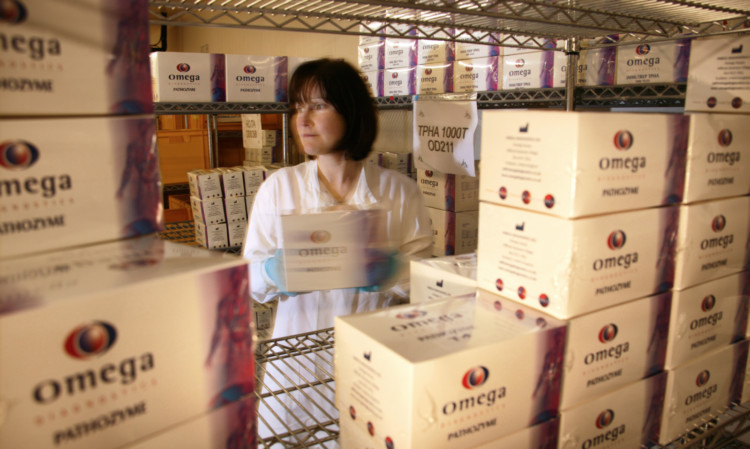Directors at Clackmannanshire diagnostic firm Omega remain “very positive” about the company’s HIV testing technology, despite revealing delays and uncertainty which saw the group’s share price fall almost 20%.
Filing preliminary results for the 12 months to the end of March, the Alva firm said it had encountered variability in field tests in Kenya and India and did not have a “crystal ball” to predict when its first orders would come.
But chief executive Andrew Shepherd said he had a “high degree of confidence” in the highly mobile Visitect CD4 test product, adding that well-funded charities and non-governmental organisations were ready to take it up.
The board believes demand will prove substantial in time, with the company’s addressable market continuing to grow from an estimated 17 million HIV positive patients who cannot obtain the treatmentthey need through a lack of access to testing in rural areas.
Meantime, the firm has “tweaked” its product and invested in staff training as it attempts to iron out the testing difficulties.
“There’s a high degree of confidence for when the product is ready and when we’re ready to go,” Mr Shepherd said.
“We’ve been promoting the product and have significant contact with significant organisations.”
Chairman David Evans said the company’s future was both brightened and dominated by the prospects of the Visitect CD4 product, though the timing of benefits was “uncertain”.
“CD4 will, without doubt, be a successful product for the group, but we would be foolish to believe that our crystal ball is better than yours in being able to forecast with certainty the decision outputs from the NGOs we are working with,” Dr Evans wrote in this report.
“This is primarily a global tender-based business, with timing driven by the availability of funds and the view of the various governments as to need at that time.
“Due to this fundamental timing uncertainty we have erred on the side of caution in terms of both revenues and building our overhead base ahead of the revenue curve.”
House broker finnCapp downgraded CD4 revenue forecasts for the present financial year from £5m to £1.5m, shifting the expected income to the following period.
Analyst Ken Redpath said a path to commercialisation highly dependent on the funding and priorities of charities and non-governmental organisations had been laid out in “exquisite detail” by directors in their statement.
The warning follows a slower-than-expected full transfer of technology from Melbourne’s Burnet Institute, completed earlier this year.
“Clearly, the delay to the completion of the technology transfer of Visitect CD4 from September 2013 to February 2014 means that the test has yet to gain commercial traction,” Mr Redpath added.
Overall, Omega saw turnover climb 3% to £11.6m in the year while adjusted pre-tax profits jumped more than 40% to £1.1m.
Sales climbed by 18% in the company’s food intolerance division, masking falls of 5% and 7.5% in its allergy and autoimmune and infectious disease arms.
Revenues from its Food Detective product remained strong in “star-performer” Poland, and also saw climbs of more than 50% in Australian and Brazilian markets during the year.
Meanwhile, Omega has completed optimisation of 24 of an expected 40 allergens for its new IDS-iSYS testing equipment and is in the midst of discussions with partners in countries where the new product is to be launched.
It is also pursuing other opportunities in neglected tropical diseases, schistosomiasis, syphilis and HIV viral load testing.
